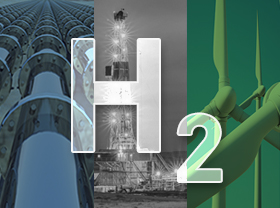 |
| Hydrogen veteran Graham Cooley, CEO of British electrolysis company ITM Power. Source: ITM Power |
.
|
This is the fifth of a five-part series exploring the burgeoning hydrogen economy and its rise — after decades of false dawns — to the top of the energy agenda in 2020.
Having witnessed first-hand the ebb and flow of market and investor attention over the last three decades, Graham Cooley continues to be an ardent believer in hydrogen technologies.
Now, 30 years since first starting work on hydrogen fuel cells and at times being in the minority as an advocate for the industry, he is among those holding the keys to a technology that many hope will play a crucial role in the energy transition, assisting in the decarbonization of hard-to-abate industrial sectors.
"I never lost faith in the fundamentals of hydrogen energy storage," the industry veteran, now CEO of U.K. electrolysis company ITM Power PLC, said Oct. 26 in an interview with S&P Global Market Intelligence.
Hydrogen businesses have been on a bumpy ride in the last 20 years. In the last big push for a breakthrough in the mid-2000s, ITM and others such as Ballard Power Systems Inc. and Plug Power Inc. saw their stock prices peak against a backdrop of political momentum, particularly behind fuel-cell mobility, before plunging and then languishing at low levels for about a decade before the most recent run on the stocks.
ITM is one of very few listed hydrogen companies still around to tell the tale, which according to Cooley resulted from a process of survival of the fittest. "When the market was less enthusiastic about hydrogen, it was more difficult to raise money. … From a pure Darwinist point of view, it certainly created a class of companies that are actually very strong, with very strong technology," he said.
After investor enthusiasm faded, much of the money going into hydrogen technology was stumped up through government grants, largely from the EU, led by the Fuel Cells and Hydrogen Joint Undertaking, a public-private partnership for research and development that was set up in 2008.
"We built our company on grant support over the years. And the very, very tangible difference now is that it's all about commercial deals," said Cooley, who has been at the helm of ITM since 2009.
 |
| ITM Power's new factory in Sheffield, England: the world's largest electrolyzer production plant. Source: ITM Power |
And those deals are rolling in. ITM is building a 10-MW electrolyzer at oil major Royal Dutch Shell PLC's Rhineland refinery in Germany and recently signed a deal with Scottish Power Ltd. for a similar unit in Glasgow, Scotland. The company is also delivering equipment to an offshore wind-powered hydrogen project in the U.K. being developed by Ørsted A/S and Phillips 66.
At a corporate level, gas giant Linde AG invested £38 million to become a major shareholder in ITM, and on Oct. 23, Italian gas utility Snam SpA took a minority stake in the company after a £30 million investment.
Much of the funding raised by ITM is being put into scaling its technology and into manufacturing. The company is set to open a new factory in Sheffield, England: the largest electrolyzer production plant in the world with annual capacity of 1,000 MW. It is also eyeing growth in after-sale equipment support and monitoring as well as investing in large-scale refueling stations for trucks and trains in the U.K., Cooley said.
'We haven't even started'
Market interest in hydrogen may have waxed and waned over the years, but Cooley is not too interested in, or convinced by, the hype cycle narrative. "I don't see this as a cyclical thing. For green hydrogen, this is lift-off," he said, given the net-zero emissions targets now in place and the availability of low-cost green power.
"The energy industry is the largest industry on the planet. And hydrogen is only beginning to scratch the surface. We haven't even started," he said.
Indeed, for all of the talk about hydrogen and strategic positioning by energy companies, the sector has little to show in terms of operational or even under-construction projects. The more ambitious capacity targets at the EU-level are backloaded toward the end of this decade, and substantial questions on the regulatory framework, infrastructure and market design are still unanswered.
But industry players from across the board are now interested, whether on their own terms or driven by environmental, social and governance pressures, Cooley added. "Net-zero is not something that the energy industry and industry in general is going to be able to ignore. It's the future. And some of them will arrive in the future late, and others will arrive early," he said, as has happened in renewable energy.
"Utilities and all the oil and gas companies [have] finally understood what's happening and are getting their backs behind it," he said.
As a result, the CEO could be about to see the underdog he has been betting on his entire career win big, but this is not about "I told you so," and the arrival of hydrogen in the mainstream does not seem to conjure up wistful memories of the pioneering early days, Cooley said.
"Honestly, I never dwell on the past. It's all about the future, really. The future is amazingly bright to hydrogen," he said. "What the past does for you is teach you how to run, and we're running really hard."




